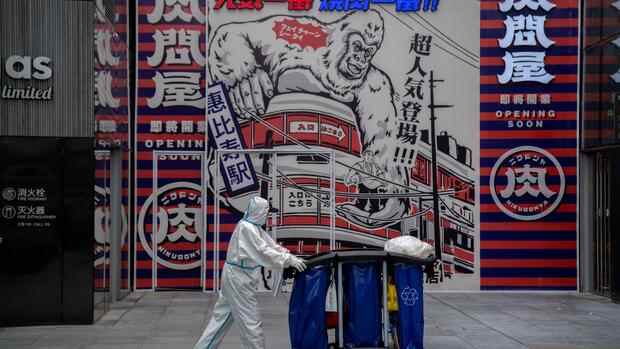The Chinese government is currently fighting an outbreak of the omicron variant.
(Photo: dpa)
Beijing China’s economy is suffering even more than feared from the draconian restrictions imposed by the Chinese government in the name of the zero-Covid strategy. Retail sales, which are used as an indicator of consumer demand, fell 11.1 percent in April compared to the same month last year.
They were significantly worse than analysts had expected – they had expected an average decline of around six percent. Already in March, retail sales had fallen 3.5 percent compared to the same period last year. Overall, retail sales in the first four months of the year were down 0.2 percent year-on-year.
Industrial production was also worse than expected. It collapsed by 2.9 percent – on average, observers had expected a slight increase. In March it had increased by 5 percent compared to the same period last year.
>>Read here: Stocks crash, slump in growth, lockdown madness: The China crash
Top jobs of the day
Find the best jobs now and
be notified by email.
The Chinese government is currently using draconian measures to get a grip on an outbreak of the omicron variant in the world’s second largest economy. In order to curb the contagion, dozens of cities across the country have been cordoned off again and again in recent months.
The approximately 25 million inhabitants of the important economic metropolis of Shanghai have been under strict house arrest for more than seven weeks. They are not allowed to leave their apartments and their housing complex – not even for a walk or shopping in the supermarket.
Hard lockdown: production facilities are at a standstill
In Beijing, too, life has almost come to a standstill. Several residential complexes are cordoned off in the Chinese capital, schools, restaurants and parks are closed. The severe measures have resulted in production facilities across the country standing still, shipping containers damming up in the ports and the transport of goods within China being significantly disrupted.
The decline in consumer demand affected almost all areas. Car sales in April fell by 31.6 percent compared to the same period last year, while demand for textiles and cosmetic products fell by more than 22 percent each.
Only the demand for food such as grain and cooking oil increased by 10 percent year-on-year. Experts believe retail sales will remain poor for the rest of the year. “We expect economic momentum to improve in the second half of 2022, but consumer demand growth is likely to remain weak,” says a recent analysis by rating agency Fitch.
In the important economic metropolis of Shanghai, many people are in lockdown.
(Photo: Bloomberg)
One reason for the poor consumer mood is the ongoing deep crisis in the Chinese real estate sector. “The drop in house prices we expect in 2022 will weigh on consumer sentiment,” Fitch said.
On Sunday, the People’s Bank of China (PBOC) lowered the mortgage rate floor for first-time homebuyers amid a slump in home-buyer loans. However, despite the sharp downturn in the economy, it left the interest rate on its one-year term loan facility at 2.85 percent on Monday.
Experts believe that with lockdowns across the country and the associated great uncertainty among consumers and companies, monetary easing could fizzle out ineffectively anyway.
More: China’s economy is in the worst shape it has been in decades
